The WD Black2 Review: World's First 2.5" Dual-Drive
by Kristian Vättö on January 30, 2014 7:00 AM ESTRandom Read/Write Speed
The four corners of SSD performance are as follows: random read, random write, sequential read and sequential write speed. Random accesses are generally small in size, while sequential accesses tend to be larger and thus we have the four Iometer tests we use in all of our reviews.
Our first test writes 4KB in a completely random pattern over an 8GB space of the drive to simulate the sort of random access that you'd see on an OS drive (even this is more stressful than a normal desktop user would see). I perform three concurrent IOs and run the test for 3 minutes. The results reported are in average MB/s over the entire time. We use both standard pseudo randomly generated data for each write as well as fully random data to show you both the maximum and minimum performance offered by SandForce based drives in these tests. The average performance of SF drives will likely be somewhere in between the two values for each drive you see in the graphs. For an understanding of why this matters, read our original SandForce article.
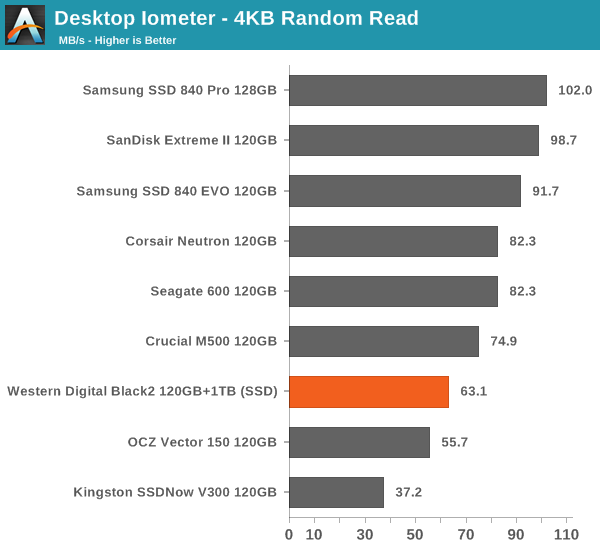
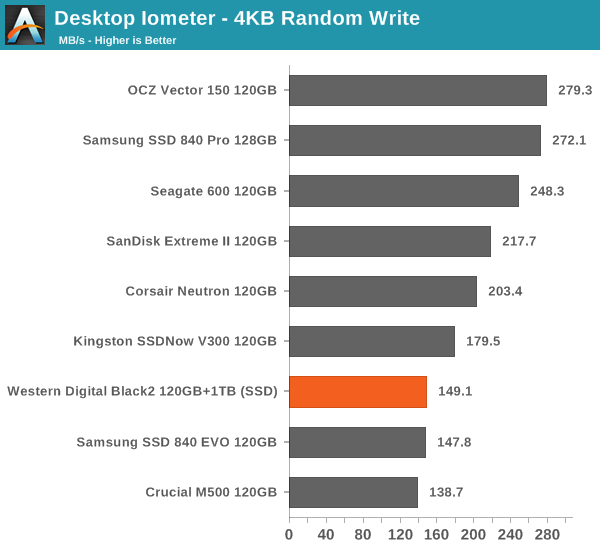
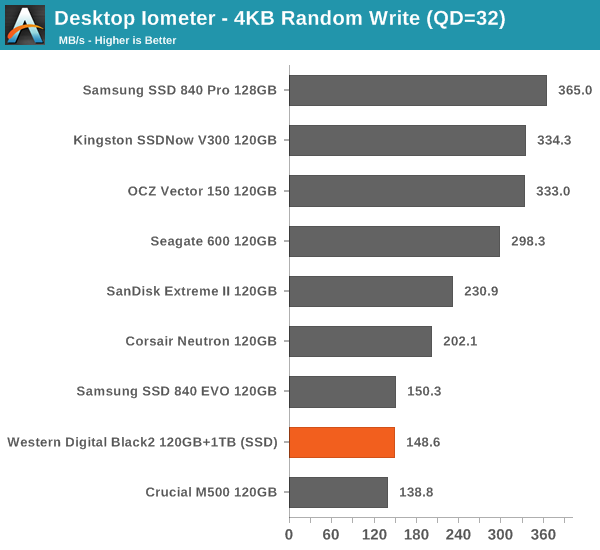
Random IO performance is relatively low per today's standards but not truly horrible. I was expecting something worse but the JMF667H turns out to be rather competitive with popular big brand drives like the Samsung 840 EVO and Crucial M500.
Sequential Read/Write Speed
To measure sequential performance I ran a 1 minute long 128KB sequential test over the entire span of the drive at a queue depth of 1. The results reported are in average MB/s over the entire test length.
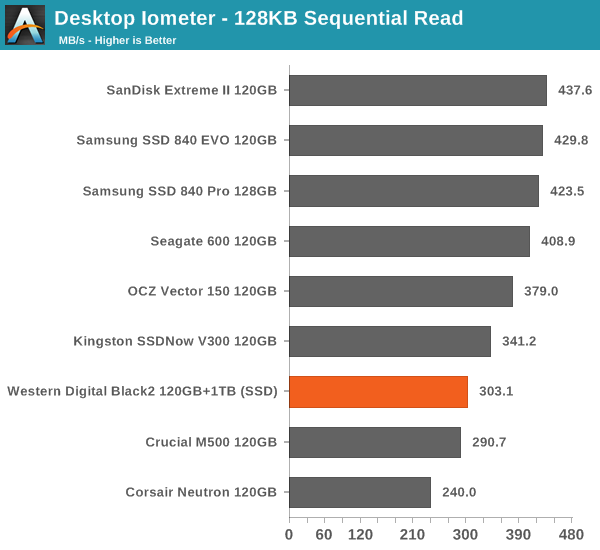
The same goes for sequential performance. It's not bad but there are far better options at 120/128GB.
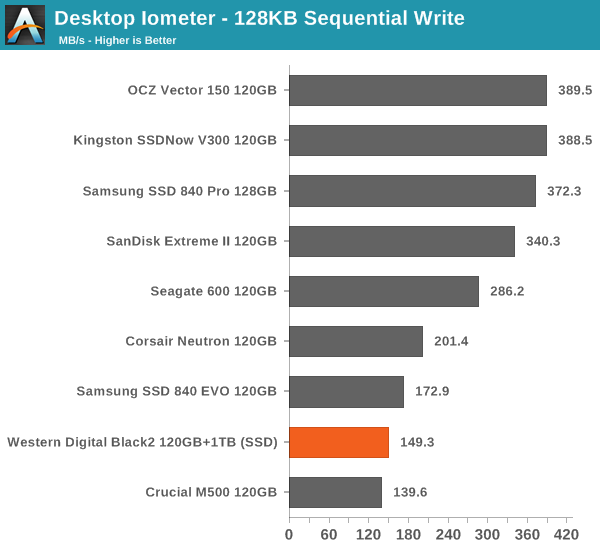
AS-SSD Incompressible Sequential Read/Write Performance
The AS-SSD sequential benchmark uses incompressible data for all of its transfers. The result is a pretty big reduction in sequential write speed on SandForce based controllers.
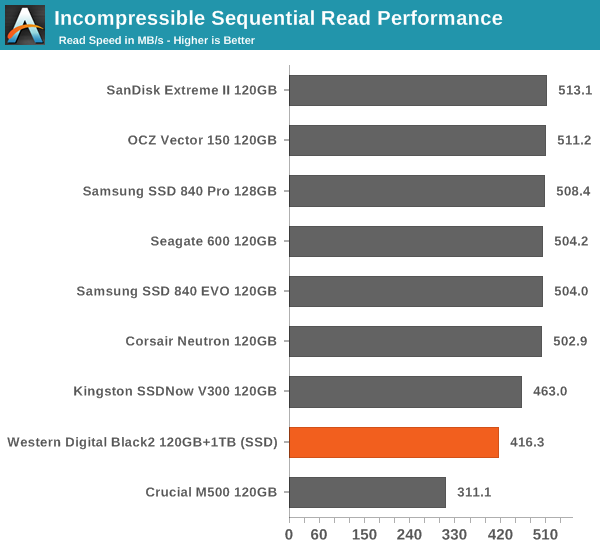
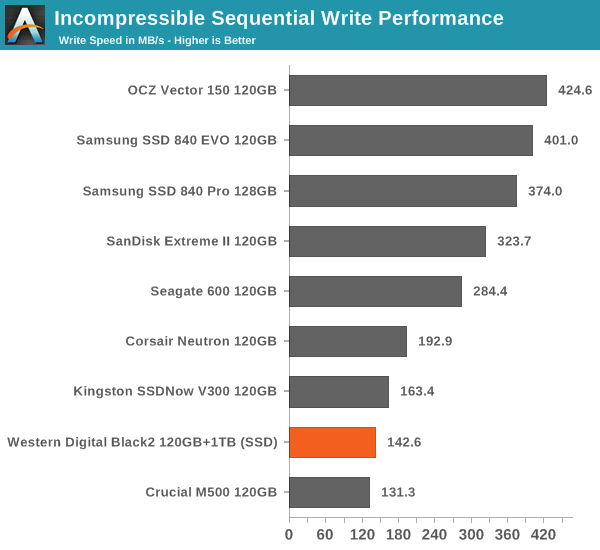










100 Comments
View All Comments
nitram_tpr - Thursday, January 30, 2014 - link
Ouch, that is one expensive drive. As you say, it appears to be the ideal solution for a laptop with only a single drive bay. I think there is another option - change the HDD for an SSD and put the HDD into the optical drive bay with an adapter.ddriver - Thursday, January 30, 2014 - link
It is kind of expensive and kind a slow and power hungry for an SSD, but still it is essentially 2 hard drives in one. I would actually get this if the SSD part was a tiny bit better. I don't think the presence of mechanical drive in the case mandates the SSD performance be any lower. I think I will just install an extra drive in the optical drive bay, seriously DELL what were you thinking who uses optical storage in 2012?lmcd - Thursday, January 30, 2014 - link
Me.Thanks Dell for considering :-)
ddriver - Thursday, January 30, 2014 - link
Poor you :) I maintain about 20 TB of data, in the past the database was much smaller so I used to back it up on CDs, then DVDs, but the damn things are just too slow, unreliable, small and the cost of storage was very high. It was this moment I began hating optical storage with passion, my life got marginally better when I destroyed all optical disks and moved everything to hard drives - faster, cheaper, more compact and reliable.I know manufacturers provide installation disks which some people end up using for years, failing to realize the software on that disk is usually out of data before they even made the purchase.
And for all scenarios a hard drive is overkill there is the USB flash drive.
I guess optical storage makes some sense on consoles and/or media center PCs, if you watch many bluray or dvd movies, but for everything else... meh... and on that dell laptop it is just dead weight and battery drain.
Morawka - Thursday, January 30, 2014 - link
Try blu ray man, blu ray's will match HDD's capacity in the near future. At present, it can already match SSD's capacity of 128GB.The blu ray tech is good up to 25 layers @ 32 GB per layer = 800 GB
Optical is far from dead when America has some of the worst bandwidth in the world.
Gigaplex - Thursday, January 30, 2014 - link
So I'd need 5 Blu-ray discs per hard drive, which would take 15 hours to write at 16x speed.JHBoricua - Thursday, January 30, 2014 - link
But what happens when one of those 4TB drives fails? Assuming you have them in a RAID array, it will probably take as long or longer for the array to rebuild, not to mention that at those capacities, the risk of another drive failing during the rebuild are simply too great if you care about your data.ddriver - Friday, January 31, 2014 - link
I don't raid, I just backup. This is IMO better. I could raid something for performance but never for safety.name99 - Friday, January 31, 2014 - link
Jesus, You sound like iOmega with the endless succession of ZIP and JAZ drives, or Cringely talking up his aluminum foil based drive (which still has not seen the light of day).So the best Blu-Ray could do (in drives that don't exist, using disks that don't exist) is a very slow version of a drive that I can buy for around $50?
Good luck getting rich with that particular technology.
Optical is dead dead dead. And quit whining about "worst bandwidth in the world" you drama queen. Go to a real third world country and see what really bad connectivity looks like. The only problem most Americans have is that they will have to wait five minutes for their drivers to download rather than 20 seconds. That's just not enough pain to keep optical relevant.
TheinsanegamerN - Saturday, February 1, 2014 - link
you forget the very restrictive bandwidth caps, the terrible customer service, the awful reliability, the throttling of data, the list goes on.